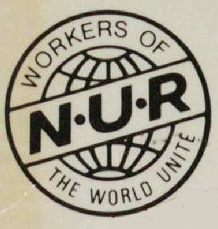Related Research Articles

The Communist Party of Australia (CPA) was founded in 1920 and dissolved in 1991. The CPA achieved its greatest political strength in the 1940s and faced an attempted ban in 1951. Though it never presented a major challenge to the established order in Australia, it did have a (relatively) large membership and a significant influence on the trade unions, social movements, and the national culture.
In British politics, an affiliated trade union is one that is linked to the Labour Party. The party was created by the trade unions and socialist societies in 1900 as the Labour Representation Committee and the unions have retained close institutional links with it.

The Transport and General Workers' Union was one of the largest general trade unions in the United Kingdom and Ireland – where it was known as the Amalgamated Transport and General Workers' Union (ATGWU) to differentiate itself from the Irish Transport and General Workers' Union – with 900,000 members. It was founded in 1922 and Ernest Bevin served as its first general secretary.

The National Union of Railwaymen was a trade union of railway workers in the United Kingdom. The largest railway workers' union in the country, it was influential in the national trade union movement.

A benefit society, fraternal benefit society or fraternal benefit order is a society, an organization or a voluntary association formed to provide mutual aid, benefit, for instance insurance for relief from sundry difficulties. Such organizations may be formally organized with charters and established customs, or may arise ad hoc to meet unique needs of a particular time and place. Many major financial institutions existing today, particularly some insurance companies, mutual savings banks, and credit unions, trace their origins back to benefit societies, as can many modern fraternal organizations and fraternal orders which are now viewed as being primarily social; the modern legal system essentially requires all such organizations of appreciable size to incorporate as one of these forms or another to continue to exist on an ongoing basis.

The Irish Transport and General Workers Union (ITGWU), was a trade union representing workers, initially mainly labourers, in Ireland.

The National Union of Public Employees (NUPE) was a British trade union which existed between 1908 and 1993. It represented public sector workers in local government, the Health Service, universities, and water authorities.
The Miners' Federation of Great Britain (MFGB) was established after a meeting of local mining trade unions in Newport, Wales in 1888. The federation was formed to represent and co-ordinate the affairs of local and regional miners' unions in England, Scotland and Wales whose associations remained largely autonomous. At its peak, the federation represented nearly one million workers. It was reorganised into the National Union of Mineworkers in 1945.
The National Amalgamated Stevedores and Dockers (NASD), sometimes referred to as the National Amalgamated Stevedores' and Dockers' Society, was a trade union in the United Kingdom.

The National Union of Scottish Mineworkers (NUSW) is a trade union in Scotland, founded in 1894 as the Scottish Miners Federation. It joined the Miners' Federation of Great Britain, and in 1914 changed its name to National Union of Scottish Mineworkers. It survives as the National Union of Mineworkers.

The Irish Trades Union Congress (ITUC) was a union federation covering the island of Ireland.
The Wool and Basil Workers' Federation of Australia was an Australian trade union which existed between 1890 and 1976. It represented workers employed in scouring and carbonising wool, fellmongery, and the processing of sheep hides into basil.
The Flint Glass Makers' Sick and Friendly Society, often known as the Flint Glass Makers' Friendly Society (FGMFS) was a trade union in the United Kingdom.
The Federated Moulders' (Metals) Union of Australia (FMMUA) was an Australian trade union which existed between 1899 and 1983. It represented moulders - skilled tradesmen who fabricated the moulds used to cast metal products in foundries. In spite of the union's exclusive attitude towards membership, which kept the total number of FMMUA members low throughout its existence, the vital position of moulders in major industries such as mining, manufacturing and the railways ensured that the union remained industrially powerful, and the union had a reputation for being highly militant.
The Bristol Miners' Association was a trade union representing coal miners in Bristol and Bedminster in England.
The General Union of Loom Overlookers (GULO) was a trade union representing junior supervisors in textile manufacturing in the United Kingdom. While most members were based in Lancashire, it also had members in Yorkshire, East Anglia and Essex.

Joseph Cross (1859–1925) was a British trade unionist.
The Confectionery Workers' Union of Australia (CWUA) was an Australian trade union which existed between 1925 and 1992. Until 1986, it was known as the Federated Confectioners’ Association of Australia (FCA). Throughout its existence, it represented factory workers in the confectionery industry, including a high proportion of women. It was also notable for its involvement in the landmark Dollar Sweets Dispute.
The Australian Transport Officers' Federation (ATOF) was an Australian trade union representing salaried officers in the transport sector, particularly in the rail and airline industries. It existed from 1924 until 1991, and was previously known as the Federation of Salaried Officers of Railways Commissioners (1924–1947) and the Australasian Transport Officers Federation (1947–1978). The union had a policy of supporting conciliation and arbitration and against strike action until 1970.
The Durham Colliery Mechanics' Association was a trade union representing mechanics working at coal mines in County Durham, in England.
References
- 1 2 Arthur Marsh, Victoria Ryan and John B. Smethurst, Historical Directory of Trade Unions, vol.4, p.248
- ↑ "Obituary: Sydney Bedford". Annual Report of the Trades Union Congress: 306. 1951.
- ↑ Hoffmann, Jürgen (2007). A Comparison of the Trade Union Merger Process in Britain and Germany. Routledge. p. 250. ISBN 1134260164.